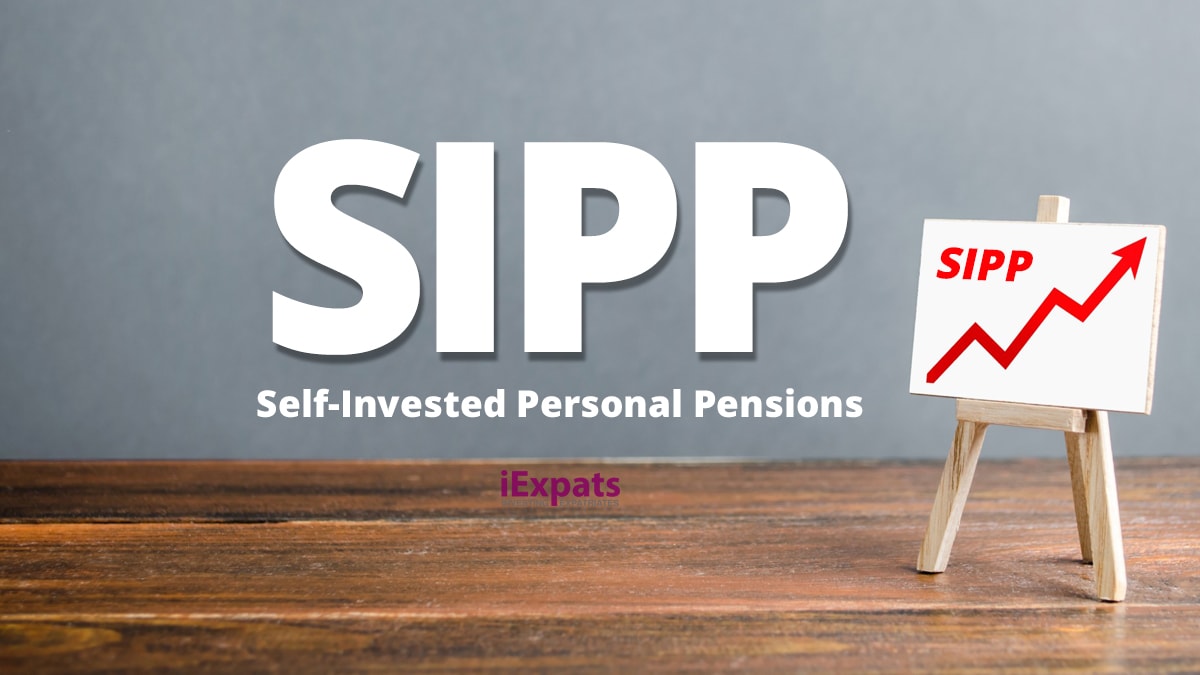A SIPP, which is short for a Self Invested Personal Pension, are a popular retirement saving choice for expats who want to take control of their investments and money.
As the name suggests, a SIPP lets someone save for retirement with a pension, while taking their own decisions about how to invest the money.
SIPPS also offer a wider range of flexible investments that are not available in a workplace or personal pension.
Expats will find SIPPs have pros and cons for offshore investors that don’t make them suitable for every retirement saver.
SIPPs – Souped-Up Personal Pensions
SIPPs are a souped-up personal pension that offer investors more control over their investments than a standard personal pension.
A SIPP is a pension wrapper.
A wrapper is a set of rules that says which investments are allowed in the SIPP, how they are managed and how savers can access their money from the age of 55.
SIPPs are mostly defined contribution pensions.
This means retirement income is based on the fund size and can rise and fall with the value of investments. SIPPs don’t supply a guaranteed income, but retirement savers can convert the fund to a n annuity that does offer a guaranteed lifetime income.
SIPPs Tax Relief For Expats
SIPPs have the same tax breaks as other pensions that make them more attractive than cash savings for many.
The main tax break is pension contribution relief, which is what the government calls the cash bonus added to your pension as a reward for saving for your later years.
The relief takes some of the money you would have paid as income tax on your earnings and puts it in your fund instead.
The top-up is based on the highest rate of income tax a saver pays.
- For every £100 of pension savings, UK basic rate taxpayers (20%) must save £80, while the top-up is £20.
- UK higher rate taxpayers (40%) must save £60 in every £100, as their tax top-up is £40.
The catch for expats is if they are UK non-resident and pay no income tax, they can’t claim pension tax relief.
While money going into a SIPP attracts tax relief and the fund grows free of capital gains tax, money going out is mostly taxed.
The first 25% of the value of a pension can be drawn tax-free, but the rest is treated as income and taxed.
Remember, how you draw your money from a SIPP is just as important for tax as how you save.
It’s a good idea to take advice from an IFA to make sure you pay the least tax possible.
Many expats may find their pension income taxed in the UK as well s the country where they live, which means looking to double taxation agreements to minimise the bill.
SIPPs have parallel rules for expats –
- Expats who stay UK taxpayers will pick up pension contribution relief on the money they set aside for retirement.
- Those who are tax resident elsewhere can still have a SIPP but will not have tax relief on their contributions.
The rule of thumb is most expats can open a SIPP, but where they have their main home determines the tax treatment of contributions into the scheme.
Find out more about the UK Statutory Residence Test and the Difference Between Residence And Domicile
Managing The Money In A SIPP

SIPPS have three levels of management:
- DIY investment management
- Hybrid management shared between the investor and a fund manager
- Full management by a fund manager
The choice is down to the saver.
The risks and rewards can be high, depending on how cautious an investor you are.
Technology means most SIPPS are managed through an online platform that allows instant trading, topping up with contributions and detailed portfolio analysis.
What Makes SIPPs Pensions Better?
The main difference between a SIPP and a personal pension is how the funds within the pensions are invested.
SIPPs offer a much wider range of investments than a standard pension with a limited choice of funds typically supervised by the company’s own fund managers.
SIPP investors can deal with:
Listed and unlisted UK and overseas stocks and shares
Listed shares have their price included in a stock market index, like the FTSE100. Unlisted shares are private trades between investors and a company that are not reported by a stock market index
Funds
Funds come in a broad range, from passive trackers that follow a stock market index to more sophisticated direct investment into a company
Cash
Savers can hold cash in a SIPP like saving with a bank or building society, but interest rates are likely to be much lower
Collective investments (like OEICs and unit trusts)
Investment trusts
Investment trusts pool cash from several investors into one amount to spread the risk if the investment should fail
Gilts and bonds
Gilts are bonds issued by a government, while companies offer bonds. Both are certificates of interest repayable on loans made by investors.
Exchange traded funds (ETFs)
ETFs track indices on stock markets. Examples of ETFs could keep pace with the price of gold, silver, crude oil, or the FTSE 100
Property and land (but not most residential property)
Some SIPPs can also raise a mortgage against property, with the rent going towards paying down the loan and the costs of running the property.
SIPP investments grow free of capital gains tax as a fund grows and income taxes on interest or dividends.
Costs Of A SIPP
Many SIPPs are cheaper to hold and manage because they are self-invested and much of the administration takes place online.
SIPPS do come with one-off and ongoing fees:
- Set up costs, which can amount to £500
- An annual management fee
- Ongoing charges, including transaction fees for buying and selling investments
- Exit fees when you close a SIPP
- Income drawdown fees – you may pay a small fee every time you wish to withdraw money from a SIPP under pension freedoms
These costs vary between providers.
It’s a good idea to compare two or three SIPPs before taking the plunge with your retirement savings to see how charges affect the fund.
Contributions And Transfers Into SIPPs

You can pay money into a SIPP from many sources, like regular monthly contributions or one-off lump sums.
It’s also possible to transfer other pension funds into a SIPP, but the move is frowned upon by regulars who point out you could lose a guaranteed retirement income and other benefits offered by some pensions.
Consult an IFA for advice about pension transfers
HMRC rules limit cap how much you can save each year and over your lifetime.
Annual Allowance
This is the most someone can save into a SIPP in a year that attracts pension contribution relief. The current annual allowance is £40,000 (2020-21)
Lifetime Allowance (LTA)
The most someone can save into a SIPP is £1.077 million (2020-21). This is the lifetime allowance and adjusts in line with any rise in the cost of living each April. The LTA is the total saved in all pensions except the state pension, not just a SIPP.
Money Purchase Annual Allowance (MPAA)
If you have drawn money from your pension, the annual allowance reduces to the MPAA cap of £4,000 a year.
SIPPs And Pension Freedoms
Providers can make their SIPPs user friendly under pension freedoms.
Once the SIPP saver turns 55, they can choose to draw the cash from their fund as they wish. That means all the fund can be taken in one go, by regular withdrawals or as and when the money is needed.
As with all UK onshore pensions, the tax-free lump sum is 25% of the fund. Income tax is paid on withdrawals exceeding the tax-free amount.
Expats should take local advice on how their SIPP fund is tax treated in the place where they live.
SIPPs And The 25% Overseas Transfer Charge
The transfer charge levied on Qualifying Recognised Overseas Pension Scheme (QROPS) does not apply to a SIPP regardless of where the expat saver lives.
The tax charge is specific to QROPS when the expat saver or offshore pension is based outside the European Economic Area (EEA), although employer schemes, public service pensions and some schemes run by international organisations are also exempt.
SIPPs may offer an alternative to a QROPS in places where expats would pay the overseas transfer charge.
Find out more about QROPS and the overseas transfer charge.
SIPPs And Estate Planning
SIPPS are outside the scope of UK inheritance tax.
Someone in the UK inheriting an unspent pension fund from a retirement saver aged up to 75 years old pays no inheritance tax or income tax.
If the saver is aged over 75, income tax may fall due.
SIPPs And Expats Returning To The UK
The tax status of SIPP funds does not change if an expat returns to live permanently in the UK, but the saver will benefit from tax relief on money paid into the SIPP once they become a UK taxpayer.
SIPP Points To Consider For Expats
Expats looking to switch to a QROPS and facing a 25% transfer charge should look at a SIPP as a tax-effective alternative.
But they are not suitable for every expat. Anyone considering a transfer should discuss their travel plans with a tax professional to make sure the SIPP is a suitable investment for them.
Points to think about include:
- Is a SIPP a recognised pension wrapper in the country the expat is moving to?
- Will their travel plans involve moving outside the European Economic Area within five years?
- Is the lifetime allowance enough to cover the expat’s pension fund growth and if not, how will they deal with the 55% tax charge that may arise?
- Will the expat continue to pay into the SIPP and accept non-residents will not pick up any relief on the contributions?
- How will the expat manage converting SIPP benefits in sterling to a foreign currency?
How SIPP Benefits Are Calculated
The value of a SIPP fund relies on balancing three factors:
- How much is paid in
- How long the money is invested
- How much the charges levied by the provider and wealth managers add up to
Unlike a final salary pension, SIPP benefits are not guaranteed nor index-linked.
However, a SIPP fund can be used to buy an annuity, which can pay a guaranteed, index-linked income for life.
How Can An Expat Open A SIPP?
Opening a SIPP is relatively easy and can take just a few minutes through some online platforms.
Expats are more likely to want cross-border tax and investment and should consult an IFA or wealth manager with a track record for opening SIPPs for expats. They should also have a backup team that can give bespoke advice concerning taxes and investments in the country where they plan to live.
Don’t forget moving funds worth more than £30,000 in total from other pensions triggers taking mandatory financial advice in the UK.
To offset this, the new tax-free retirement advice allowance of up to £500 in three goes applies to SIPP savers.
SIPPs For Expats Explained FAQ
SIPPS are flexible pensions for hands-on investors, including expats.
But investment is only part of the retirement saving equation – investors also need to know about residence and tax to make sure their money is working hard for them.
This guide explains the basics of SIPPs for expats, but anyone with any doubt over if a SIPP is right for them and their financial circumstances should take advice from an IFA.
Here are some answers to the most asked questions expats ask about SIPPs:
SIPPs and QROPS are similar pension wrappers, but the main difference is SIPPs are a UK-based pension but QROPS are offshore pensions for British expats and former international workers in the UK.
A SIPP is not better than a QROPS or vice versa, but one might suit an expat better under certain circumstances. A SIPP could be a better choice for an expat living in a country where a QROPS transfer might attract the overseas transfer charge.
A SIPP might also be the pension of choice for an expat on assignment who intends to return to live in the UK.
Self invested personal pension. Also referred to as SIPPs, which means Self invested personal pension scheme.
Yes. You can take on responsibility for investments or hand the job to a fund manager
Can a UK resident pay into a SIPP from abroad?
Yes, but if they can claim tax relief on the money, they pay in depends on their residence. UK residence can collect tax relief, while non-residents cannot.
Depending on you, you can either take expat financial advice from an IFA who will help with the process or go online to a financial provider and set up your SIPP through their portal.
